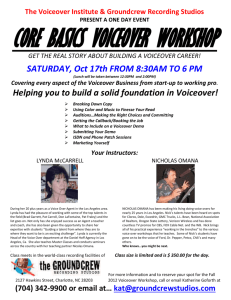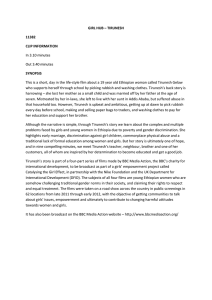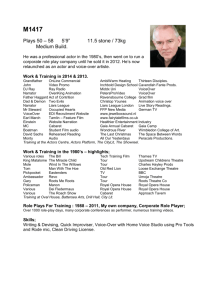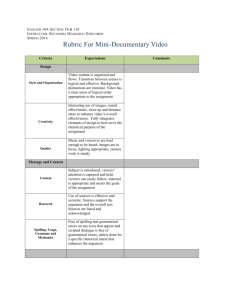Morning Paper transcript
advertisement
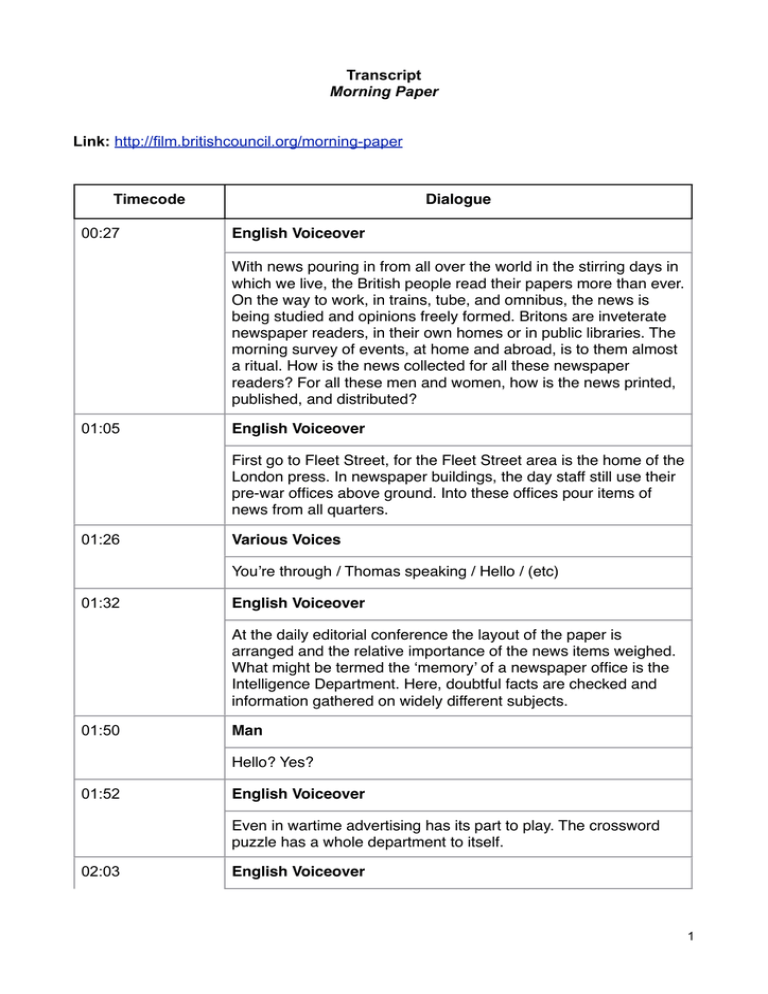
Transcript Morning Paper Link: http://film.britishcouncil.org/morning-paper Timecode 00:27 Dialogue English Voiceover With news pouring in from all over the world in the stirring days in which we live, the British people read their papers more than ever. On the way to work, in trains, tube, and omnibus, the news is being studied and opinions freely formed. Britons are inveterate newspaper readers, in their own homes or in public libraries. The morning survey of events, at home and abroad, is to them almost a ritual. How is the news collected for all these newspaper readers? For all these men and women, how is the news printed, published, and distributed? 01:05 English Voiceover First go to Fleet Street, for the Fleet Street area is the home of the London press. In newspaper buildings, the day staff still use their pre-war offices above ground. Into these offices pour items of news from all quarters. 01:26 Various Voices You’re through / Thomas speaking / Hello / (etc) 01:32 English Voiceover At the daily editorial conference the layout of the paper is arranged and the relative importance of the news items weighed. What might be termed the ‘memory’ of a newspaper office is the Intelligence Department. Here, doubtful facts are checked and information gathered on widely different subjects. 01:50 Man Hello? Yes? 01:52 English Voiceover Even in wartime advertising has its part to play. The crossword puzzle has a whole department to itself. 02:03 English Voiceover 1 02:03 Here in the Art Department, the staff are responsible for the layout and the presentation of the illustrations. 02:11 English Voiceover The words “newspaper office” conjure up before all else the reporters’ room. Here it is, but not at all how it is sometimes represented in the films. Hard work, certainly, but no hustle. From its correspondence all around the globe, and from world famous news agencies, reports and messages pour in. 02:37 English Voiceover Meanwhile, the leading article is being discussed by the editor and his leader writer. The sub-editors check and revise all written material as it comes in from reporters and correspondents. All the staff have their minds on their jobs, for on the roof above their spotters keep a lookout for enemy planes. 02:59 English Voiceover As evening comes, lights flash throughout the offices to warn the staff that it’s blackout time and windows must be darkened. 03:10 English Voiceover Now, the night staff comes onto work and at this time of day are accommodated below ground. The fire squad make sure everything is in readiness to deal with incendiary bombs. Always a danger, even in peacetime, fire is particularly menacing in a newspaper building, where tons of paper are required to produce a single issues of a national newspaper. 03:40 English Voiceover Besides its fire squad, some papers have their own Home Guard to protect the building. 03:49 English Voiceover Also below ground, the leader writer works, and his copy is one of the last items to be finished. The written copy comes to men working at type-composing machines. A combination of typewriter and foundry, they cast the metal type in column, which are then made up into forms or pages. 04:12 English Voiceover Here are the forms. These have to be hammered flat, and then locked into position in their iron frames. 04:38 English Voiceover 2 04:38 Then a proof of the page is printed and carefully checked. All this composing and checking must be finished by nine o’clock so that the waiting presses can start running at 9:20. This enables the first edition to catch the first newspaper train, the ten o’clock from Marylebone. 04:56 English Voiceover No raid yet. 05:03 English Voiceover Newspapers are not printed direct from type because speed is so essential. Printing from a cylinder is much more rapid. An impression of the pages of type is therefore made on Papiermâché, which is trimmed and curved before going to the foundry. 05:38 English Voiceover Here, for the purpose of rotary printing, a semi-circular metal plate is cast of each page for fixing to the cylinders. 06:27 English Voiceover These plates are arranged in order on the presses and locked into position. Sometimes there’s a rush. A minute or two in hand tonight. 06:38 English Voiceover The presses start up. Slowly, at first. Then, at full speed. 07:03 English Voiceover The alert. Unmoved by the raid above, the Editorial Departments handle late news items and the presses thunder on. 07:31 English Voiceover In this room, the wartime signals are controlled – warning and danger lights for aircraft overhead. Relying on the signals, work in the press room goes on steadily and efficiently as usual. To newspaper men, nothing matters except getting the newspaper out on time. Outside, the raid is in full blast. 08:26 English Voiceover In peacetime, the papers used to go upstairs to be dispatched; now they stay below. 08:35 English Voiceover 3 08:35 The lights dim – danger overhead. The staff go on quietly. Here below the surface they’re fairly safe. 08:50 English Voiceover But the van drivers put on their tin helmets. They may have to drive through an inferno to reach the London mainline stations. High explosives, incendiaries, shells, fire, may lie between them and the stations. 09:19 English Voiceover And they reach the station and the newspaper train starts just on time. 09:30 English Voiceover Back in Fleet Street, the presses are still running and later editions are coming out. Night workers and air raid workers are thankful for the canteen which provides hot drinks and snacks through a noisy night until, at last, the roar of the presses dies down and the all-clear rings out. 09:56 English Voiceover Workers who have been prevented from getting home by the raid sleep peacefully in cellar dormitories. The routine of the office has gone on as usual. So the paper boys get to work as usual. 10:18 Man Hmm. London had another raid last night. 10:21 English Voiceover But raid or no raid, the papers were out on time. 4
